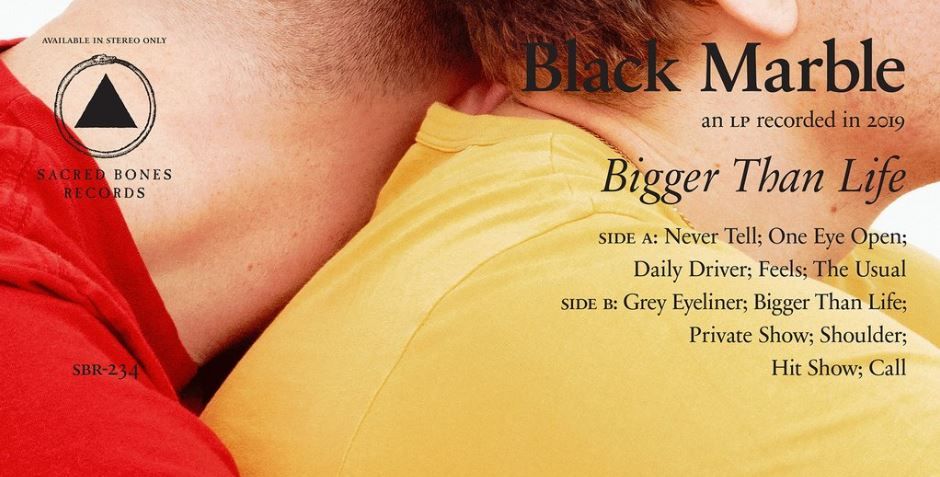Black Marble releases lackluster ‘Bigger Than Life’
by Seamus McAvoy
2019-11-22

Black Marble
Bigger Than Life
Sacred Bones Records · Oct. 25, 2019

A rapidly pulsating dial-tone is quickly joined by another at a slightly offset rhythm at a slightly higher pitch, creating a combined blaring, like a cosmic telephone ringing off the hook. We’re going back in time now, the symphony sounding probably as a portal ought to, to the height of the 1980s cold-wave scene, where the cool people wear black and sport some fashion of pentagram accessory. There’s a scream, then another, and then silence. The bass line appears now, out of nothing, possessing an irresistible momentum that the lo-fi vocal track and lush instrumentation barely manage to keep up with. This is, more or less, how Black Marble’s It’s Immaterial (2016) begins, and just one reason why the expectations for 2019’s Bigger Than Life may have been so high.
It’s Immaterial was the group’s second full-length album and first project without member Ty Kube, who acted as a significant contributor to the clear potential displayed on the band’s full-length debut album, A Different Arrangement (2012). The duo that broke onto the music scene in Brooklyn was now down to a solo act, featuring Los Angeles-based musician Chris Stewart. To his credit, Stewart’s absorption of the LA aesthetic was rapid. It’s Immaterial’s album artwork features a suburban house that screams Van Nuys in the way that band American Football’s album art screams Urbana. On top of that, It’s Immaterial’s art also features an ultramodern tween sorceress that appears to be in the middle of a conjuring.
Questions will be asked of any promising project that loses what can only be assumed to have been 50 percent of its creative direction, but Stewart proved to be up to the challenge on It’s Immaterial, a project which shares its name with a British new-wave band from Liverpool (compare them to the Manchester-based Joy Division and you have something like an inverse of the Beatles/Oasis dynamic). The album shows clear sonic influences from new wave’s highest peaks, blended with a touch of 2010s warmth.The bass line on “Iron Lung” has the power and tasteful monotony of an Iron Curtain record but leaves the production loose enough that the sounds of fingers sliding up and down the neck of the guitar are still audible. The album’s broader soundscape is a high watermark for what is perhaps the beginning of the end of enjoyable lo-fi music in contemporary indie rock.
As Black Marble’s latest album, Bigger Than Life, begins, it almost feels like a return to form. The opening track, “Never Tell,” is led by the driving rhythm of the drum and bass tracks, with slightly muted synths filling out the mix. But something is a bit off from the group’s previous work. The soundscape is deceptively shallow, the vocal track lifted out of the lo-fi shadows of previous projects, and perhaps not for the better. “One Eye Open,” the first single released with the announcement of the new record, auspiciously begins with the infectious energy of an underground house track but quickly loses steam. There’s simply no development of a promising beat, and the mix feels awkward and clunky. The crisp vocal track relative to former albums is simply an odd fit, and the track feels twice as long as its 4:43 minute run time (the longest in Black Marble’s discography).
There seems to be a general misconception about “lo-fi” music, in that the deployment of a rugged, less-than-polished production quality is often used to smooth the rough edges of dodgy musicianship. Only under the microscope of a crisp mixing style can the true worth of the music be measured, or so goes that line of thinking — this would be incorrect. Lo-fi, at least inasmuch as Black Marble adhered to it, is about letting the atmosphere of the music supersede the music itself. Hiding behind the production style implies a reduction of form, but Black Marble’s innovative re-imagining of late 70s/early 80s soundscapes with an en vogue twist is anything but. Lo-fi epitomizes postmodern art; it is a rebellion against the impossibly flawless production of mainstream pop, an alternative to predominant but unrelatable soullessness.
Bigger Than Life almost stays true to that definition, especially on its highlights, like the track by the same name as the record and the first minute or so of “Never Tell.” However, despite the few standouts, ,the album as a whole feels deceptively empty and bland. The record is like a domed tartlet in that the sheen of its outer layer has remained more or less in tact but the organic sweetness of the core has been replaced by animal hoof gelatin. Perhaps a die hard Black Marble fan will throw the aptly named “Feels” onto one of their “feels” playlists, but it seems unlikely that Better Than Life will be nearly as well received as the group’s previous projects.
